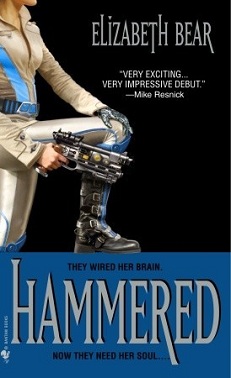
Hammered
Elizabeth Bear
324 pages
published in 2005
Elizabeth Bear is a newish science fiction writer who I've been aware off, but hadn't read anything off until now. Hammered is her first novel, published in 2005 along with its two sequels, Scardown and Worldwired. It was well recieved, with Bear winning both the 2005 John W. Campbell Award for Best New Writer and the 2006 Locus Award for Best First Novel. Both are well deserved, as this is one of the better first novels I've ever read. Elizabeth Bear is in complete control throughout and it reads like the work of a much more experienced writer.
Hammered starts out in the most cyberpunk posssible way, with local gangster boss Razorface bringing a kid overdosing on an army combat drug called Hammer to Maker, Jenny Casey, a UN combat veteran of what wasn’t WWII, now left with a cyborg left arm and prosthetic left eye, to see if she can save him. Razorface has mouth full with "a triple row of stainless steel choppers", hence his nickname, while Jenny has hers because she fixes things. Neither is fond of Hammer, a dangerous drug even when pure and the batch the kid o.d. on is anything but. Some corporation is leaking tainted drugs in their city (Hartford, Connecticut) and together they have to stop them. Meanwhile, an online multiplayer game in which the best players get a chance at piloting a virtual star ship is infiltrated by an AI, who suspects the game is more than just entertainment. It’s 2062, climate change and the wars resulting from it have wrecked the world, China and Canada are locked in a Cold War and somebody’s after Jenny Casey. It might even be her sister.
But while the setting might be cyberpunk, Jenny Casey's life lacks the glamour a heroine in a Gibson story would've had. Her metal arm suffers from phantom pains, fucks up her shoulder and back where it attaches to the rest of her and while her artificial eye is an advantage in a low light situation, it's a pain most of the rest of the time. She has had to live with her cybernetic implants, not just the arm and eye but also the enhanced nervous system that can make her reaction speed inhumanly fast when needed, for some twentyfive years and now that she's pushing fifty, she's suffering for it. She's no Molly, cool cyberchick, but a woman who has had to learn to live with the limitations of her body.
She's not the only great female character in this novel. There's also Dr. Elspeth Dunsany, who spent the last twelve years in prison for violation of the Military Powers Act, released so she can do what she refused to do twelve years ago, built a tame AI for Unitek, the most powerful corporation in the world, brought back by colonel Valens, the villain of the piece, the spider in the web who is also an old 'friend' of Jenny and who is moving all the players together for his project. Elspeth allowed him to get her, both to get out of prison but also because her father is dying. Like Jenny, she's not a young woman anymore and like her, she also has to live with what her history has brought her.
Not that Bear neglects her male characters. Apart from Valens, who isn't quite the black and white villain you see him as in the first half of the book, there's also Gabe Castaign, the man who actually saved Jenny from that burning APC in South Africa that cost her her arm, now also working for Valens. There's Razorface of course, somebody else who has to struggle with his personal history and his status as number one gangster in Hartford with younger and more ruthless ones coming up to challenge him. But most of all there's the AI, Richard Feynman, personality based on the American mathematician. There's always a temptation for a cyberpunk writer to use an AI as deux ex machina, but Bear mostly avoids this.
One of the dirty little not so secrets of first wave cyberpunk was how much it shared the obsession with getting into space and off Earth as the salvation of humanity with classical science fiction, only slightly more realistic (ie with all the politics and crime it nicked from the hardboiled detective genre). This idea is at the heart of Hammered too, the one thing in which it followds older cyberpunk like Neuromancer unreservedly. In most other aspects, Hammered subverts or rejects the stereotypical cyberpunk tropes, as with Jenny's cyborgisation above. These aren't low punks with high techs, disaffected teens and twentysomethings looking cool, but real grownups dealing with real grownup problems, as well as the legacy of everything they fucked up in their lives when they were twentysomething themselves. It reminds me of Melissa Scott's Trouble and her Friends, another book that took the easy cliches of the underground hacking elite and looked at them with an adult eye.
I read the first third or so of this book the way I normally read, in short bursts inbetween doing other stuff, but the last twothirds I read in one big gulp, everything else forgotten. And once I'd finished, I read the other two books in the same way. Higher praise than that I cannot give.
Webpage created 03-05-2013, last updated 10-05-2013.